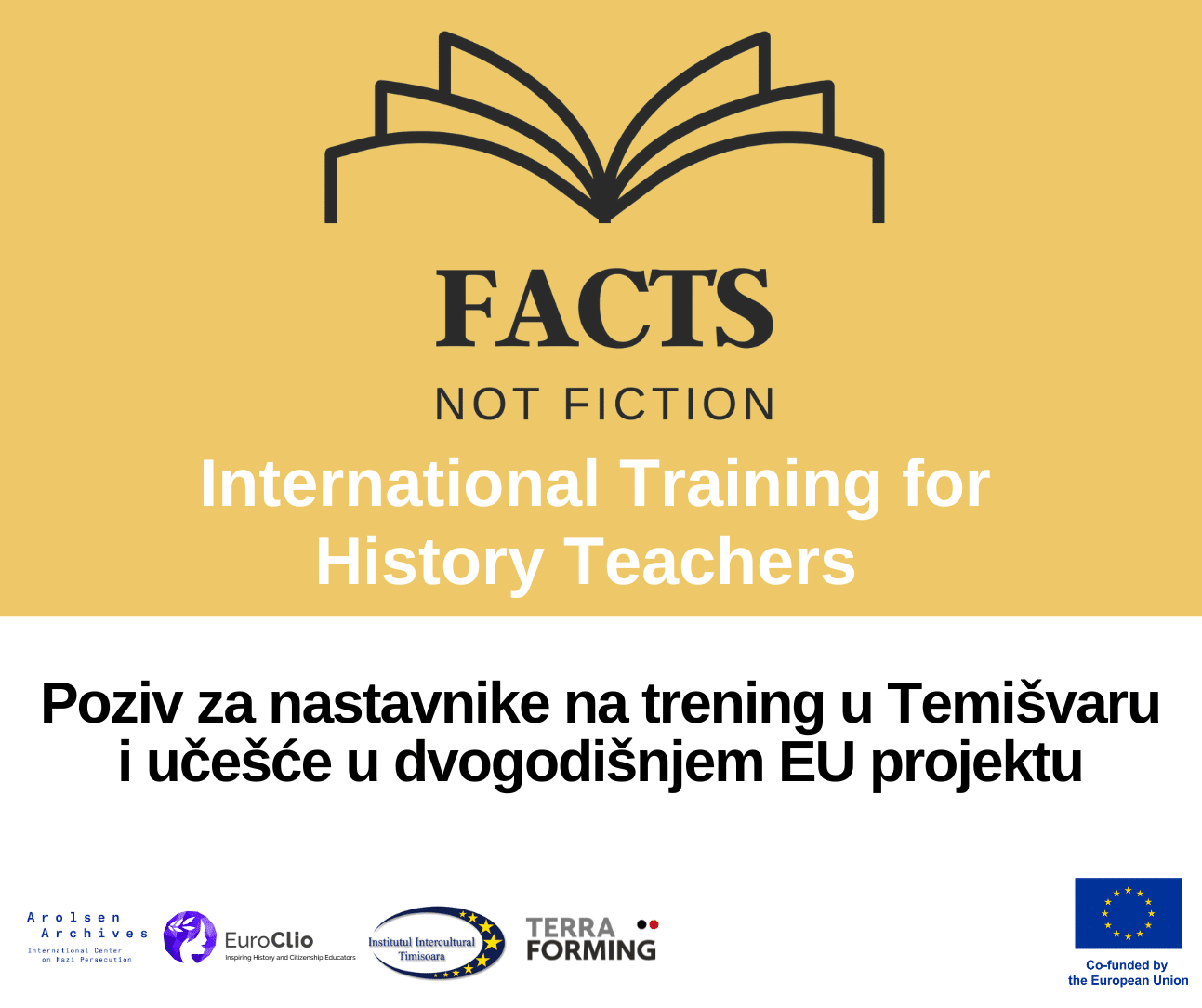Note
THANK YOU. WE RECEIVED MANY APPLICATIONS, AND THE CALL IS NOW CLOSED!

EuroClio—European Association of History Educators, in partnership with Terraforming, Intercultural Institute Timișoara, and the Arolsen Archives—invites history teachers living in Germany, Romania, Serbia and other countries to apply for the International Teacher Training Seminar focused on the pedagogy of place-based learning within the context of a local history project about the history of victims of Nazi persecution and crimes committed during the Second World War by Nazi collaborators.. The training will take place in Timisoara, Romania, on 8 and 9 August, with 7 August as the day of arrival.
The Seminar is part of the project Facts Not Fiction—Young Historians Show How to Learn from the Past, funded by the European Union. This project will set up students to develop their own local history projects about different groups of people that were persecuted by the Nazis and their collaborators. By conducting local research, accessing historical sources, and collaborating with different institutions such as archives and museums, students gain tools to share their unique knowledge with a wider audience in their community and share personal histories of victims that are lesser-known. This will invite students to step into the shoes of public historians.
The rise of new media has made history more accessible, yet often unreliable. Misconceptions, such as the belief that only Jews suffered under Nazi crimes and crimes committed by Nazi collaborators, perpetuate discrimination and misinformation. The project seeks to empower youth to counter these tendencies by becoming informed historians and leaders in raising awareness about the history of the Holocaust and Nazi persecution, and its relevance today.
For this Seminar, we are looking for Team Members who implement place-based learning local history projects with their students who will research the history of different victims of Nazi persecution and share the findings with a wider audience through co-created exhibitions, podcasts, graphic novels and heritage tours in their locale. The local place-based learning research activities will take place from September – December 2024, and local training activities for the participating students, including online international youth gatherings will take place throughout the entire school year, with an in-person International Youth Gathering taking place in April 2025, in Bratislava at the EuroClio Annual Conference where a smaller group of students will present their work, guided by their teachers.
We will select one Team from each of the countries mentioned in the call. A Team consists of two educators, for example, two history teachers from the same school, or one teacher and one museum educator or other education professional. We are looking for applicants who teach classes on totalitarianism, Holocaust memorials, and mid-20th-century histories of migration and persecution, including the persecution of the Roma and Sinti or queer and disabled communities by the Nazi regime and its collaborators.
The Seminar will include sessions on the pedagogy of place-based learning, how to set up a place-based learning project with your students, developing competencies for democratic culture through Holocaust Education and working with archival sources.
Costs for the participation in the International Seminar (including two nights of accommodation) and EuroClio Annual Conference are fully covered, including travel, accommodation and subsistence. In addition, each Team will receive a stipend of 2000 EUR to cover any costs that are related to the implementation of the local research activities by youth, based on real costs.
To apply, please send one Letter of Motivation written by you and your Team Member, and CVs of both Team Members to contact@terraforming.org
We would also like to receive a Letter of Support from your school or institution. Please submit by 1 July 2024.
Please note that the Consortium partners will recruit Team Members from their respective countries. This means that applications from Serbia will be reviewed by Terraforming, applications from Germany will be reviewed by Arolsen Archives, applications from Romania will be reviewed by Intercultural Institute Timisoara and applications from other countries in Europe will be reviewed by EuroClio. Applications from Serbia, Romania and Germany will therefore be forwarded to the respective project partners for review.